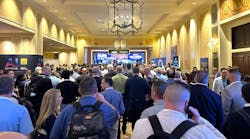They call this place where I am sitting in front of my laptop the Raleigh-Durham International Airport . I appreciate the fact they didn't change the geographic name to some deceased local dignitary, but I am sure that's in the works. It already happened to Washington 's National Airport to honor President Reagan and Baltimore-Washington International when they tagged that dreary pile with Thurgood Marshall's name.
Sadly, they didn't just rename them; in both instances they made them one long name: Baltimore Washington International Thurgood Marshall Airport and Luggage Sorting Center . Alright, I added the last bit, but you get my point. It becomes a tongue twister giving directions to taxi drivers. Perhaps they should take a clue from the only airport originally named for political dignitary John Foster Dulles. You jump in a cab, simply say the word “Dulles,” and you're on your way.
Here at RDU as well call it, the international appellative was applied when United Airlines offered one daily flight to London's easily pronounced Gatwick airport, and a couple Air Canada flights north of the border. I suppose the longer name was worth the effort and expense to put all those extra letters on the signs.
I am traveling light, so I checked in at the unattended electronic kiosk. I got a boarding pass in a matter of seconds, and then went down the stairs to go through TSA's security screening. The first wicket I was forced to navigate was a young woman in a TSA uniform asking for my boarding pass and my identification. I promptly produced my ticket and my retired military ID card. She accepted both, then grabbed a handheld black-light and scrutinized my military ID like an experienced forgery expert. She looked quizzically at it, looked up at me and was met with my most practiced passive expression. She scanned it again with her fancy light, and then said she could not accept it. She wanted another form of ID.
I asked her what was wrong with the card. She said it looked like it was “printed.” I decided against a semantic debate, and simply asked why that ID was not adequate. It was certainly good enough to allow me in the cockpit of a multi-million-dollar aircraft and into the bowels of the Pentagon. She had no answer.
She glanced at my wallet and noticed I had a North Carolina driver's license. She nodded toward it. I acted like I didn't understand. I started scrounging through my briefcase for more identification. I noted the audible sighs of exasperation coming from behind me.
I was finally able to produce my passport. She made a show of scanning it with the black light, but I could tell she was now flustered and would have probably accepted my bank savings book. She handed it back and waved me through with a scowl. As I walked past, she turned to her compatriot and shared a sighting of some TV celebrity the previous day.
I completed the luggage screening and stopped at the TSA officers' desk. I explained what happened, and again asked why a military ID was inadequate. I got exactly what I expected; the officer presented several possible reasons why the agent didn't accept my identification. He couldn't tell me if there was policy preventing me from using my military ID. He didn't bother to look anything up or call someone who might actually know. He suggested I just give her the darn driver's license.
My colleague, Bruce Schneier, author of Beyond Fear: Thinking Sensibly About Security in an Uncertain World (Copernicus Books, 2003), uses the term “security theater” to describe an environment where the appearances of security have little to do with the actual reduction of risk. In the case of airport screening, much appears to be Security Theater for the traveling public. Pointing this out does not usually enhance one's security credentials, however.
This phenomenon is most likely due to the way most people perceive threats to their safety. The fact something bad could happen does not mean it will happen, nor does it infer anything about how much time, effort and worry we should invest in mitigation strategies. That requires a reasoned, analytical approach. However, fear for one's safety can override reason and analysis.
As our country advances into the new century, now would be an ideal time to look back and apply cold reason and fact-based analysis to the dynamic threats we face, both at home and abroad. Staging this security theater is just no longer adequate. It is far too costly, and the consequences of getting it wrong are unthinkable.
A note for TSA: what exactly is your policy for accepting/denying military identification cards at the prescreening checkpoint? This retired GI would simply like to know. The personnel sporting your uniform should know as well.
John McCumber is a security and risk professional, and is the author of Assessing and Managing Security Risk in IT Systems: A Structured Methodology , from Auerbach Publications. If you have a comment or question for him, please e-mail John at: [email protected]
.

